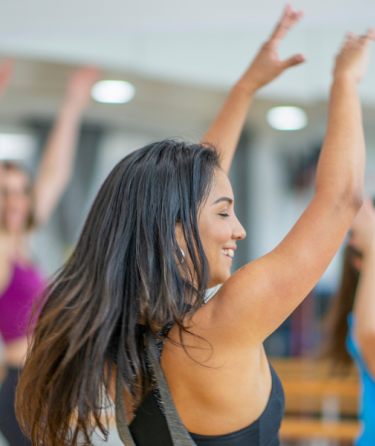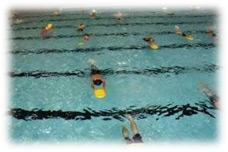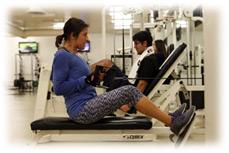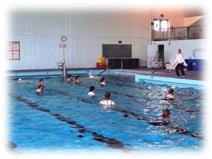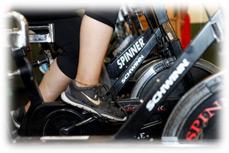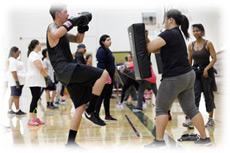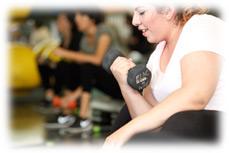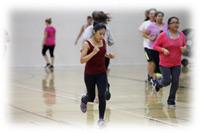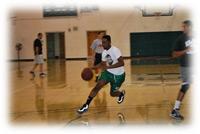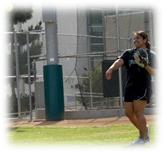Kinesiology Courses
Kinesiology (KIN)
(UC Credit Limit: any or all Kinesiology activity courses combined; maximum credit 4 units)
Laboratory, 3.0 hours.
This course is designed to meet the needs of students with disabilities who require restricted or modified activities. Individualized exercise programs are performed by students with instruction emphasizing the basic elements of physical fitness and training principles.
Laboratory, 3.0 hours.
This course is designed to meet the needs of students with disabilities who require restricted or modified activities. Individualized exercise programs are performed by students with instructional emphasis placed on strength training principles and techniques.
Laboratory, 3.0 hours.
This course meets the needs of students with disabilities who can benefit from individualized cardiovascular endurance training. Development of cardiovascular endurance through the use of bicycle ergometers is the major focus of the course.
Laboratory, 3.0 hours.
This course is designed to meet the needs of students with disabilities to develop gross motor skills and to facilitate participation in life-long activities. Activities are designed to enhance fitness, self-esteem, and social interaction. The main focus of the class is skill development. Sports may include but not limited to: Basketball, flag football, over the line, lacrosse, and bowling. Students with disabilities must provide a physician’s prescription for exercises.
Laboratory, 2.0 hours.
This course enables students to gain awareness of the importance of proper swimming techniques/postural alignment, including progressive learning skills; such as water exploration, primary skills, stroke readiness, stroke development, stroke refinement, skill proficiency, and advanced skills in accordance with the seven levels of the American Red Cross. Nutrition and concepts of fitness are also covered.
Laboratory, 3.0 hours.
This course focuses on precision alignment, core strength, and building an awareness of the body. Pilates involves a Kinesthetic awareness through a series of floor exercises, optimizing a postural alignment and muscular balance to enable maximum range of movement for body strength and flexibility. Appropriate modifications for specific fitness levels are considered. This class is easy to follow and includes instruction and understanding of Pilates methods and exercises utilizing safe and popular Pilates exercises.
Laboratory, 2.0 hours.
In this course, students participate in basic stretching techniques to improve overall flexibility including active and passive stretching and myofascial release training. Emphasis is placed upon flexibility, balance, breathing techniques, spatial awareness, and safety during stretching. Technique modifications to account for physical limitations are emphasized. A brief examination of the evolution of the various forms of stretching reflecting cultural differences and diversity, human anatomy, nutrition, and wellness concepts related to overall fitness, age, and gender are also addressed.
Laboratory, 2.0 hours.
In this course, students participate in intermediate stretching techniques to improve overall flexibility including active and passive stretching and myofascial release training. Emphasis is placed upon flexibility, balance, breathing techniques, spatial awareness, and safety during stretching. Technique modifications to account for physical limitations are emphasized. A brief examination of the evolution of the various forms of stretching reflecting cultural differences and diversity, human anatomy, nutrition, and wellness concepts related to overall fitness, age, and gender are also addressed.
Laboratory, 3.0 hours.
This course introduces students to basic aquatic skills, such as floating, kicking, and gliding, and incorporates the development, practice, and theory of basic swimming strokes. The course emphasizes the development of basic water safety techniques to assure confidence and mobility in aquatic activities and to help create confidence in the water, as well as an evaluation of physical fitness.
Prerequisite: Kinesiology 301-1.
Laboratory, 3.0 hours.
This course covers intermediate techniques of swimming, terminology, and fluid mechanics in water. Swimming strokes include freestyle, backstroke, breaststroke, and butterfly. Racing starts, flip turns, dives, and touch turns are introduced on a beginning level. Interval training concepts are introduced to build endurance. Indoor and outdoor water safety is reviewed in this course.
Prerequisite: Kinesiology 301-2.
Laboratory, 3.0 hours.
This course covers intermediate techniques of swimming, terminology, and fluid mechanics in water. Swimming strokes include freestyle, backstroke, breaststroke, and butterfly. Racing starts, flip turns, dives, and touch turns are introduced on a beginning level. Interval training concepts are introduced to build endurance. Indoor and outdoor water safety is reviewed in this course.
Laboratory, 3.0 hours.
This fitness conditioning class consists of a series of exercises and aerobic dance steps in conjunction with stretching and body dynamics to help promote cardiovascular and muscular fitness.
Laboratory, 3.0 hours.
This course develops cardiovascular conditioning and fitness through running and swimming laps. It enables students to gain awareness of the importance of proper running techniques/postural alignment, including progressive resistance training and conditioning for the purpose of training for a triathlon. Nutrition and concepts of fitness are also covered.
Laboratory, 3.0 hours.
This course develops and encourages positive attitudes and habits with regards to cardiovascular efficiency, body composition, flexibility, muscular strength, and muscular endurance to achieve lifelong fitness. The students rotate through a series of weight training, core, and cardiovascular exercises in both anaerobic and aerobic training methods. Each student upon entry, is screened and assessed using a variety of physical fitness measuring techniques. The screening and assessment process is then repeated at the conclusion of the semester. This class also gives students the tools to achieve lifelong fitness and the techniques and knowledge to better prevent heart disease and diabetes.
Laboratory, 3.0 hours.
This course covers the intermediate principles that encourage positive attitudes and habits with regard to cardiovascular efficiency, body composition, flexibility, muscular strength, and muscular endurance to achieve lifelong fitness. The students rotate through a series of weight training, core, and cardiovascular exercises in both anaerobic and aerobic training methods. Each student upon entry, is screened and assessed using a variety of physical fitness measuring techniques. The screening and assessment process is then repeated at the conclusion of the semester. This class also gives students the tools to achieve lifelong fitness and the techniques and knowledge to better prevent heart disease and diabetes.
Laboratory, 3.0 hours.
This course covers advanced principles that encourage positive attitudes and habits with regard to cardiovascular efficiency, body composition, flexibility, muscular strength, and muscular endurance to achieve lifelong fitness. The students rotate through a series of weight training, core, and cardiovascular exercises in both anaerobic and aerobic training methods. Each student upon entry, is screened and assessed using a variety of physical fitness measuring techniques. The screening and assessment process is then repeated at the conclusion of the semester. This class also gives students the tools to achieve lifelong fitness and the techniques and knowledge to better prevent heart disease and diabetes.
Prerequisite: Kinesiology 328-1.
Laboratory, 3.0 hours.
This course covers the intermediate principles designed to build on basic techniques from Bicycle Spinning I. Intervals, rolling hills, sprints, climbs, runs, and jumps challenges students to improve their cardiovascular system, help build leg strength, burn calories, and increase endurance.
Prerequisite: Kinesiology 328-2.
Laboratory, 3.0 hours.
This course covers the advanced principles designed to build upon intermediate techniques from Bicycle Spinning II. Students participate in a variety of advanced rhythmic drills involving variable speed and resistance simulating rolling hills, sprints, climbs, runs, and jumps. Using high intensity interval training students improve their cardiovascular fitness, build muscular strength and endurance, and increase their resistance to fatigue.
Prerequisite: Kinesiology 330-1.
Laboratory, 3.0 hours.
This is the second level intermediate non-contact activity course designed to build on basic kicking and punching techniques from Cardio Kickboxing-1. New techniques and combinations are added to improve overall fitness including: Cardiorespiratory endurance, muscular strength and endurance, flexibility, body composition, aerobic dance, kickboxing, boxing, and execution.
Prerequisite: Kinesiology 330-2.
Laboratory, 3.0 hours.
This course covers the advanced principles designed to build on intermediate techniques from Cardio Kickboxing II. Knee and elbow strikes, kicking, punching, and defense positions to challenge students to improve their cardiovascular system, help build upper and lower body muscular strength, aid in calorie expenditure, and overall endurance. This is a non-contact activity course.
Laboratory, 3.0 hours.
This course enables the student to participate in basic Zumba group exercise that combines a fusion of high energy Latin and International music with unique moves and combinations. Zumba integrates some of the basic principles of aerobic, interval, and effective fitness resistance training to maximize caloric output, cardiovascular benefits, and total body toning. Zumba provides a non-intimidating opportunity for non-dancers to participate in a group aerobic class.
Prerequisite: Kinesiology 336-1.
Laboratory, 3.0 hours.
This course enables the student to participate in intermediate Zumba group exercise that combines a fusion of high energy Latin and International music with unique moves and combinations. Zumba integrates principles of aerobic, interval, and effective fitness resistance training to maximize caloric output, cardiovascular benefits, and total body toning. Zumba provides a non-intimidating opportunity for non-dancers to participate in a group aerobic class.
Laboratory, 3.0 hours.
This beginning course is a high-intensity, full body workout that targets all of the major muscle groups. Training exercises are taught in intervals combining basic boxing combinations using punch pads, cardiovascular drills, along with body weight exercises. Students train individually, with a partner, and in a group setting.
Prerequisite: Kinesiology 338-1.
Laboratory, 3.0 hours.
This intermediate course is a high-intensity, full body workout that is designed to build on basic boxing techniques from Power Boxing 1. New training exercises are taught in intervals combining intermediate boxing combinations using punch pads, high intensity cardiovascular drills, along with intermediate body weight exercises. New techniques and combinations are added to improve overall fitness. Students train individually, with a partner, and in a group setting.
Laboratory, 3.0 hours.
This course combines Indoor Cycling (AKA 'Bicycle Spinning') using the stationary bike with off-the-bike exercises for a full body workout. Students ride along to upbeat music as they burn a substantial amount of calories, lengthen and strengthen muscles, build core stability, tone biceps and triceps, and improve their cardiovascular health.
Prerequisite: Kinesiology 339-1.
Laboratory, 3.0 hours.
This course covers the intermediate principles designed to build on basic techniques from Spin and Sculpt I. Intervals, rolling hills, sprints, climbs, runs, and jumps challenges students to improve their cardiovascular system, help build leg strength, aid in calorie expenditure, and increase endurance. Students participate in a variety of resistance training exercises using free weights and resistance bands off-the-bike to build muscular strength and endurance of most major muscle groups.
Laboratory, 3.0 hours.
This course enables students to gain awareness of the importance of exercise, including progressive resistance training and conditioning for the purpose of body shaping and toning muscles. Nutrition and concepts of fitness are also covered.
Prerequisite: Kinesiology 350-1
Laboratory, 3.0 hours.
This course covers the intermediate principles of weight training for men and women. It develops a general program of progressive resistance exercises with adaptation and implication for the individual student. Attention is given to terminology, use of equipment, safety precautions, program development, fitness assessment, heavy rope training, care and prevention of injury, nutrition for fitness, steroid use, anatomy and physiology.
Laboratory, 3.0 hours.
Students learn the basic fundamental skills and knowledge necessary to play badminton such as the serve, forehand, backhand, clear, drop, and smash shots. Also covered are singles and doubles strategy, along with the history of badminton, basic terminology, rules, and scoring. Safety and selection of equipment are included.
Laboratory, 3.0 hours.
This course offers instruction and practice in fundamental table tennis skills, basic techniques, rules, strategies, and competition.
Laboratory, 3.0 hours.
This course acquaints the student with the rules, skills, and strategy of basketball. Both offensive and defensive basketball are emphasized. Drills and games make up the class activity.
Laboratory, 3.0 hours.
This course is designed to provide weekly participation in vigorous physical activity involving group work in flag football techniques, terminology, rules, and regulations.
Laboratory, 3.0 hours.
This course is designed to teach students the basic soccer skills of passing, dribbling, shooting, and goalkeeping. The course also introduces basic theories of individual and team offense and defense, as well as the Laws of the Game, proper etiquette, terminology, and the components of fitness. Students learn proper soccer techniques with practice skills and feedback.
Laboratory, 3.0 hours
This course is a second-level softball class that gives instruction on advanced softball skills, techniques, rules, and game strategies. Students are required to compete in scrimmage situations against local junior college teams. This course is designed for prospective intercollegiate softball players.
Laboratory, 3.0 hours
This course in introductory volleyball is designed to teach the basic volleyball skills of passing, setting, spiking, serving, and blocking. The course introduces individual and team offense and defense systems, as well as the rules, etiquette, terminology, and strategies for volleyball.
Announcements
N/A
Upcoming Events
N/A
